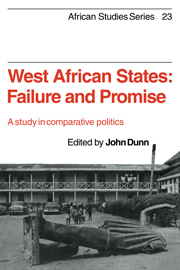2 - Ghana
Published online by Cambridge University Press: 19 January 2010
Summary
The Ghanaian Studies industry has made any extended survey of the main events in Ghanaian political history since March 1957 largely and mercifully redundant. The last twenty years of Ghana's story are copiously if (perhaps) unevenly dealt with in a large number of recent works. In brief, then, Ghana was destined to be the first sub-Saharan African colony to go beyond the initial step of internal self-government when it was granted independence by the United Kingdom government in 1957. The former Gold Coast became Ghana under the same Convention People's Party government which had won the colony's first general election in 1951. Kwame Nkrumah was its prime minister, a position he had held de facto since that same general election and one he was to hold until his election as president of Ghana in 1960.
In each of the three pre-independence elections the Convention People's Party (CPP) had gained a plurality of votes cast although, as has often been noted, that vote never constituted more than the support of about 35 per cent of the enfranchised electorate. Until the hotly contested election of 1956, the competition for power had been a profoundly unequal one in terms of moral power, immoral power and sheer sophistication. The CPP had been first at the post with the acceptably populistic brand of nationalism which had wide appeal; any attempt to outflank the CPP by using the same or a watered-down version of that ideology was doomed to failure.
- Type
- Chapter
- Information
- West African States: Failure and PromiseA Study in Comparative Politics, pp. 22 - 35Publisher: Cambridge University PressPrint publication year: 1978
- 3
- Cited by

